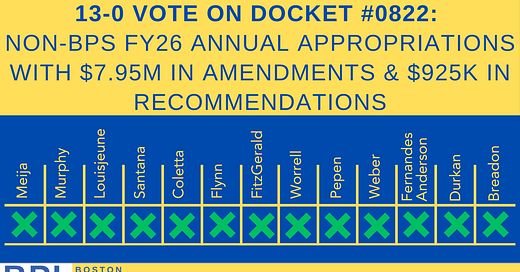Weekly Transcript Round-Up for 6/06/25
Council approves Mayor Wu's $4.6B budget with <$8M in changes; Unanimous support for budget amendments complicates Wu's veto math; Louijeune & Bok appear to disagree on income discrimination in Boston
ICYMI: Boston Policy Institute & the Center for State Policy Analysis have released a new report quantifying the impact of falling office values on Boston’s budget: the Ongoing Fallout from Boston’s Empty Offices. This new report follows up BPI & cSPA’s ground-breaking February 2024 report, the Fiscal Fallout of Boston’s Empty Offices, which started the conversation about how historically high office vacancy rates & falling office values would impact Boston & MA, and what to do about it.
Read more about this latest report, and the impact that BPI is having on the public conversation about Boston’s budget, local economy, and public policy landscape, in this week’s press coverage of the report: Bloomberg; Politico; Boston Herald; SHNS; Boston Business Journal; Boston Globe; WBUR; Commonwealth Beacon; Axios; and Contrarian Boston.
On Wednesday the Council capped off weeks of budget hearings by unanimously approving Mayor Wu’s FY26 budget with just under $8M in amendments - barely more than .1% of the total budget - plus a little over a $1M in recommendations, the lowest dollar total change the Council has attempted to make since new budget rules came into effect in back in 2022 for the FY23 budget. Those changes are now with Mayor Wu, who will be able to either sign or veto the changes. Outside of those actions there was one other speech during this week’s budget debate stood out for BPI: an apparent disagreement about the ease with which Section 8 voucher-holders are able to find housing between Boston Housing Authority Administrator Kenzie Bok on one hand, and Council President Ruthzee Louijeune & the Council on the other.
While the changes the Council made to the budget were minimal, it was notable that the Council made these changes unanimously. That 13-0 vote is important if Mayor Wu vetoes any of the Council’s actions, because veto overrides require 9 Council votes. The unanimous vote makes Mayor Wu’s path to getting the 5 votes needed to sustain her vetoes hard to reach: even if Mayor Wu’s staunchest 3 allies on the Council - District 5’s Enrique Pepen, District 8’s Sharon Durkan, and At-Large Henry Santana - switch from support to opposition as they did last year, the body would still have the votes to override the Mayor’s vetoes.
If Mayor Wu does decide to issue vetoes, it will likely be over concerns that the Mayor expressed during last year’s budget process about two large pots of money, which together constitute for than half of the $7.95M in changes the Council made to the FY26 budget:
More than $3.4M worth of the budget changes the Council made this week moves money out of “execution of courts” funds, a move that the Mayor questioned the legality of last year after last year’s budget votes;
$925k worth of Council changes move money around inside of departmental budgets, changes that Mayor Wu has said the City is not bound to respect.
Read more about those concerns in this Boston Herald article from June 27, 2024.
A line from City Council President Ruthzee Louijeune’s speech laying out why she was supported the amended version of Docket #0822 stood out because it seems at odds with something that BHA Administrator Bok said earlier this week on Commonwealth Beacon’s podcast “The Codcast.”
Here is Louijeune - she is Speaker 0 & starts at the 2:02:28 mark of the transcript:
I think we work collectively here, not only on vouchers, but you can't place those vouchers if you're being discriminated against, which is why it's incredibly important that we're also investing in housing testers, in fair housing testers. There's no fair housing testing happening right now in the City of Boston given the actions of the federal government, and so it is incredibly incredibly important.
Compare that to what Bok said to Jennifer Smith on the Codcast - Bok starts at the 13:05 mark in the podcast:
The BHA has got a landlord portal, and frankly the proof is in the pudding. We see lots of landlords who are accepting our Section 8 tenants, who are actively reaching out us when they have a vacancy. The BHA with our 18,000 voucher portfolio is right up against the limit, we’re utilizing every single voucher that we’re entitled to by HUD. We would absolutely utilize more if they gave us more, and we see it providing housing stability for people. We see our residents getting out of homelessness into housing stability.
Bok’s interview with Smith did not touch on the proposed cuts to federal funding for organizations the help enforce fair housing laws, which funds Suffolk University Law School’s Housing Discrimination Testing Program. Kelly Vieira, the director of that program, laid out the situation at a budget hearing earlier this year - she is Speaker 11 & starts at the 1:45:21 mark in the transcript. At that same hearing Councilors heard about how while last year’s budget - FY25 - included funding for the City of Boston to launch its own fair housing testing program, that didn’t actually happen - this exchange between Councilor Weber & City Hall staff starts at the 1:01:37 mark.
Boston’s issues with enforcing fair housing laws pre-date the Trump administration. The widest reaching recent effort to enforce fair housing laws was launched last February by two non-profits: New York City-based Housing Rights Initiative partnering with Lawyers for Civil Rights to sue a number of local landlords and real estate brokers over charges of income discrimination.
Boston Policy Institute, Inc is working to improve the public conversation - help us by following BPI on YouTube, TikTok, Facebook, Instagram, Threads, Twitter, and LinkedIn.





